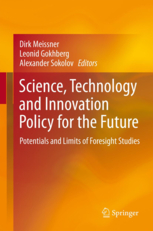Science, Technology and Innovation Policy for the Future
A multi-author book “Science, Technology and Innovation Policy for the Future. Potentials and Limits of Foresight Studies” edited by Dirk Meissner, Leonid Gokhberg and Alexander Sokolov is published by Springer Publishing House.
 |
| Science, Technology and Innovation Policy for the Future. Potentials and Limits of Foresight Studies. — Meissner, Dirk; Gokhberg, Leonid; Sokolov, Alexander (Eds.). — 2013, XV, 330 p. 87 illus., 85 in color. ISBN 978-3-642-31826-9 |
Foresight studies are commonly understood as a measure supporting governments, public agencies and companies in designing future oriented strategies. The editorial book brings together contributions from leading international scientists, representatives of national governments and international organisations like Organisation of Economic Cooperation and Development.
The book gives practical guidance for policy makers, analysts and researchers on how to leverage the use of Foresight studies which are common practice in many countries for future STI policy approaches. The book outlines approaches and experiences of integrating such Foresight studies in the elaboration and implementation of science, technology and innovation policies at different levels. It delivers insights into practical approaches of developing science, technology and innovation policy measures oriented towards future societal and technological challenges based on evidence drawn from experiences with comparable policy measures worldwide.
The book consists of 4 major sections, accomplished by an introduction and future outlook oriented summary.
In the introduction, “The Meaning of Foresight in Science Technology and Innovation Policy” Dirk Meissner, Leonid Gokhberg and Alexander Sokolov introduce the key themes of the book, its authors, and describe the potential of Foresight for forming the agenda of successful science and technology policy.
The instrument of Foresight and methods of its results evaluation are described in the first section of the book using selected case studies of completed Foresight projects. The accumulated experience on Foresight research is represented by the leading Russian and foreign experts and practitioners in the field of strategic forecasting, members of the HSE ISSEK international laboratories. Ian Miles, head of the Laboratory for Economics of Innovation, professor of the University of Manchester, offers a look at Foresight as a Service. Dirk Meissner, deputy head of the Laboratory for Science and Technology Studies, describes “Results and Impact of National Foresight Studies” and “The Meaning of Indicators of Foresight Studies”. A comprehensive framework for the assessment of national Foresight studies is developed by Anna Sokolova and Ekaterina Makarova in the article “Integrated Framework for Evaluation of National Foresight Studies”.
The second section is devoted to assessing the prospects for long-term development of certain priority industries and sectors of science. Oleg Karasev and Anastasia Edelkina propose a coherent vision of the future of nanotechnology markets (Sectoral Foresight Studies: the Future of Nanotechnologies). Konstantin Vishnevskiy, Oleg Karasev, Dirk Meissner and Elena Vetchinkina implement a new approach to roadmapping for emerging technologies in their article “A Toolkit for Integrated Roadmaps: Employing Nanotechnologies in Water and Wastewater Treatment”. Philip Shapira, professor of the University of Manchester and Georgia Institute of Technology, Jan Youtie, director of Policy Research Services at the Enterprise Innovation Institute at Georgia Institute of Technology, and Sanjay Arora, doctoral student at the School of Public Policy at Georgia Institute of Technology, describe “Early Patterns of Commercial Activity in Graphene”. Ozcan Saritas, research professor at HSE, describes the Systemic Foresight methodology.
The third section introduces the reader some of the large-scale international and national Foresight projects and experience of Foresight integration into policy making. Director of the HSE Foresight Centre, Alexander Sokolov, describes the evolution of Foresight in Russia and major Foresight projects in the field of science, technology and innovation. Kerstin Cuhls, Foresight project leader in Fraunhofer Institute for Systems and Innovation Research, describes the development of Foresight in Germany, tries to trace some of the effects of these Foresight processes and proposes to think over why it is so difficult to really have an impact on policy making. Jennifer Cassingena Harper from Malta Council for Science and Technology demonstrates increasing of the effectiveness of European Union STI policy while it is built on strategic Foresight activity (Implementing Foresight study results in policy action and measures: EU experience).
The fourth section includes three articles. Luke Georghiou, vice president of the University of Manchester and director of Policy Research Programme in Manchester Business School, emphasizes the importance of forecasting global challenges for STI policy (Challenges for Science and Innovation Policy). Dirk Meissner, Vitaly Roud and OECD senior economist Mario Cervantes sharpen the question about goals of innovation policy and practice of public innovation support funding (Innovation Policy or Policy for Innovation? In Search of the Optimal Solution for a Policy Approach and Organisation). Leonid Gokhberg and Dirk Meissner propose a view on Foresight methodology as a reliable tool for comprehensive assessment and interpretation of indicators of science, technology and innovation.
The book concludes with the editorial article “Targeting STI Policy Interventions — Future Challenges for Foresight”, which describes the strong interconnection of Foresight and STI policy and states the question about more and more increasing role of Foresight in the STI policy arena.
The book “Science, Technology and Innovation Policy for the Future. Potentials and Limits of Foresight Studies” is a valuable resource for policy makers, researchers, analysts and Foresight practitioners. It gives real checklists and guidelines for making more value of Foresight studies and leveraging the potential impact of STI policies.
